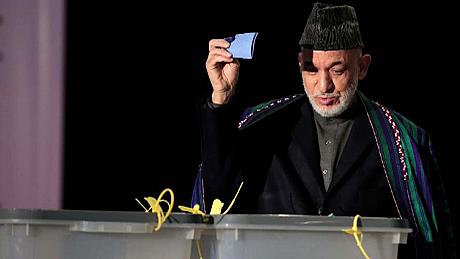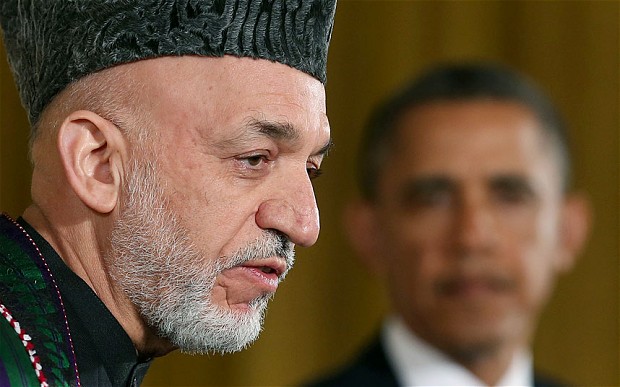Afghans celebrated a largely peaceful election on Saturday, as turnout exceeded predictions despite Taliban threats to disrupt the vote to choose President Hamid Karzai’s successor.
Afghans celebrated a largely peaceful election on  Saturday, as turnout exceeded predictions despite Taliban threats to disrupt the vote to choose President Hamid Karzai's successor.
Saturday, as turnout exceeded predictions despite Taliban threats to disrupt the vote to choose President Hamid Karzai's successor.
Long queues of voters waited throughout the day outside many of the 6,400 polling centers before the prolonged process of counting began, with preliminary results not due until April 24.
Whoever emerges victorious must lead the fight against the Taliban without the help of US-led combat troops, and also strengthen an economy reliant on declining aid money.
The country faces a politically-testing few months as it undergoes its first democratic transfer of power, and many Afghans fear a repeat of the fraud scandals that marred the last presidential election in 2009.
If no candidate wins more than 50 percent of the vote in the first round a run-off is scheduled for late May.
There were no major terror attacks during polling, and organizers hailed the election a major success, despite complaints that a shortages of ballot papers had denied some citizens to right to vote.
"Today, I can claim that the enemies of Afghanistan have failed in their plan to disrupt the election process," Interior Minister Omar Daudzai told reporters.
"People's participation in the election was unprecedented and it was a huge success."
The final turnout could exceed seven million, the head of the Independent Election Commission (IEC), Ahmad Yusuf Nuristani, said, though this was a preliminary estimate and may change. Initial predictions in 2009 proved inaccurate.
Around 13.5 million people were eligible to vote, putting the estimated turnout above 50 percent -- a significant increase on 2009, when only around a third of voters cast ballots.
Security was tight as polls opened at 7:00 am (0230 GMT) after the militants rejected the election as a foreign plot and urged their fighters to attack polling staff, voters and security forces.
Afghanistan's third presidential election brings an end to 13 years of rule by Karzai, who has held power since the Taliban were ousted in a US-led invasion in 2001, and will be the first democratic handover of power in the country's turbulent history.
The NATO coalition force is pulling out its last 51,000 combat troops this year.
Poll security is a major concern following a string of high-profile attacks in the capital Kabul, most recently a suicide bombing at the Interior Ministry on Wednesday that killed six police officers.
Interior Minister Omar Daudzai said all 400,000 of Afghanistan's police, army and intelligence services were being deployed to ensure security around the country. While there have been no significant attacks on the candidates, a charity's guesthouse, a luxury hotel and offices of the Independent Election Commission have all been hit.
Afghans Hail Peaceful Election, High Turnout Predicted
Afghans celebrated a largely peaceful election on Saturday, as turnout exceeded predictions despite Taliban threats to disrupt the vote to choose President Hamid Karzai's successor.
Long queues of voters waited throughout the day outside many of the 6,400 polling centers before the prolonged process of counting began, with preliminary results not due until April 24.
Whoever emerges victorious must lead the fight against the Taliban without the help of US-led combat troops, and also strengthen an economy reliant on declining aid money.
The country faces a politically-testing few months as it undergoes its first democratic transfer of power, and many Afghans fear a repeat of the fraud scandals that marred the last presidential election in 2009.
If no candidate wins more than 50 percent of the vote in the first round a run-off is scheduled for late May.
There were no major terror attacks during polling, and organizers hailed the election a major success, despite complaints that a shortages of ballot papers had denied some citizens to right to vote.
"Today, I can claim that the enemies of Afghanistan have failed in their plan to disrupt the election process," Interior Minister Omar Daudzai told reporters.
"People's participation in the election was unprecedented and it was a huge success."
The final turnout could exceed seven million, the head of the Independent Election Commission (IEC), Ahmad Yusuf Nuristani, said, though this was a preliminary estimate and may change. Initial predictions in 2009 proved inaccurate.
Around 13.5 million people were eligible to vote, putting the estimated turnout above 50 percent -- a significant increase on 2009, when only around a third of voters cast ballots.
